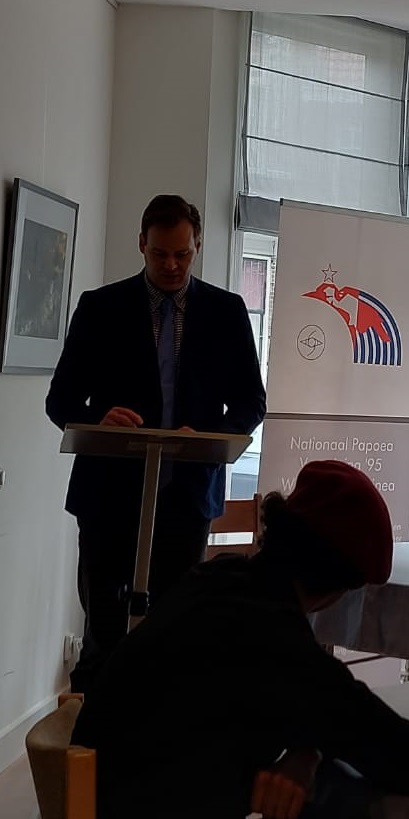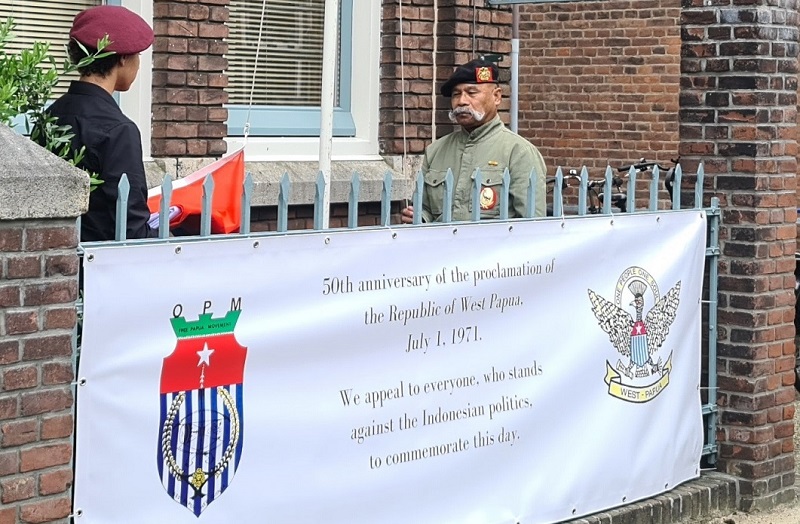Good day.
It is an honour to attend this gathering to celebrate the July 1, 1971 proclamation after 50 years. I look forward to the next speeches which will undoubtedly highlight the history of the struggle for self-determination and the declaration of independence.
Today is not a commemoration, but expressly a celebration.
Now is not only the time to look at history, but also to face the future. We live in a rapidly changing world. We must respond to these changes and ensure that the self-determination of the Papuans is given a new impulse. I want to briefly discuss the right to self-determination.

The right to self-determination encompasses several aspects. Thus, it is prominent in the charter of the United Nations that all peoples have the right to self-determination. This right allows them to freely determine their political status and their economic, social and cultural development. In practice, however, this does not mean that West Papua will immediately be offered a seat in the UN via the declaration of independence of 1 July 1971. The interpretation of the right to self-determination is subject to changing insights. The contemporary view of self-determination is based on a spectrum that runs from internal to external self-determination. Internal self-determination relates to the political and social rights of a population group within a recognized UN member state, while external self-determination involves the complete independence of the current state whereby a new state with potential UN membership is created.
To start with one end of the spectrum of self-determination: external self-determination:
According to the Montevideo Convention, a State is an international legal entity if it fulfils four basic elements:
It has:
1. a permanent population.
2. a defined area
3. a government and
4. the capacity to establish relations with other countries.
At present, West Papua does not meet these criteria. In addition, there is also the principle of the territorial integrity of existing states that ensures that peoples who do not see themselves represented in a current state are confronted with a dilemma.
At the other end of the self-determination spectrum is internal self-determination. The wishes of a population group for greater self-determination are facilitated within the existing boundaries and various forms of regional autonomy and self-government can be implemented. It is also highly questionable whether West Papua has internal self-determination.
The right to self-determination could also be based on, and inferred from, the universal and fundamental human rights, whereby every person enjoys the right to a dignified life and where there is a need to be an individual who is part of a community that represents you. Herein lies another contentious issue. The Papuans are exposed to structural discrimination and are hindered in their personal and communal development. Examples of this discrimination are seen in the media almost every day and it is of great importance to combat this injustice. However, something is only a right if it is also laid down in an agreement, because otherwise it is just an idea that no one has to abide by. Fortunately, there are many laws and treaties that provide the Papuans with rights. However, they are often not or insufficiently applied to actually arrive at a fair and just situation. Indonesia has nevertheless signed and ratified most of the UN conventions and is also bound by ASEAN conventions and its own laws prohibiting discrimination.

The world has changed dramatically since the declaration of independence on July 1, 1971. There are many new opportunities, challenges and threats affecting the position of West Papua and the Papuans. The economic development of Asia in recent decades has led to more prosperity and a better life for many. It has also led to political power shifts from Europe and America to Asia. These power shifts lead to new possibilities. Examples of this can be found in the various emancipation movements in Europe and America that are the result of shifting interests and insights, while these emancipation movements themselves have also actively contributed to the major changes in society. This same process also influences the current and especially future developments surrounding the Papua struggle in Indonesia.
It is therefore essential that all possibilities are fully utilized to liberate the Papuans from a socially subordinate position and to give them full status as world citizens. It is therefore important that there is a functioning and legitimate representation of the Papuans that plans, coordinates and carries out these activities. The Papuans are fortunate to have leaders who have heard the cry of the people and are working together to protect and promote the rights of the Papuans and the development of West Papua.
It is also encouraging to see that after fifty years there is still a vital movement that strives for self-determination for the Papuans of West Papua. By ramping up the activities within international organisations, informing the population through social media and joining global emancipation movements, this movement now has much more opportunities than it had fifty years ago to make the dream of justice for the Papuans come true. I am convinced that Mr. Simon Sapioper and his cabinet will energetically continue the fight for justice and make a difference, bringing the Papuans closer to self-determination. I hope that there will be more gatherings in the near future that will celebrate the successes of the struggle for emancipation and self-determination. I also look forward to working with Simon Sapioper to advance the cause for justice through activities within international organizations and others.
Thank you for the opportunity to speak and I wish everyone a good day.
Jeroen Zandberg
